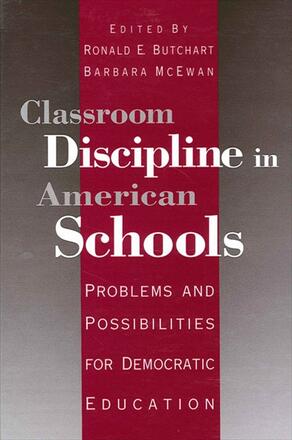
Classroom Discipline in American Schools
Problems and Possibilities for Democratic Education
Alternative formats available from:
Breaks the silence regarding modes of classroom control, bringing contemporary political, moral, and democratic perspectives to bear on the issues.
Description
CHOICE 1998 Outstanding Academic Books
For both teachers and the public, school discipline and classroom management are acute problems in contemporary schools, often taking precedence over issues of curriculum and pedagogy. Yet, surprisingly, discipline and management have escaped sustained critical analysis. This book is a unique, heuristic effort to break the silence regarding modes of classroom control, explicitly bringing democratic, moral, and political perspectives to bear on the issues. It analyzes classroom relationships in terms of ethical and political considerations, arguing that current behaviorist and "teacher-tricks" approaches to classroom control fundamentally contradict expectations of moral development and democratic ends.
Classroom Discipline in American Schools rekindles a debate that has atrophied in the last several decades. It invites teachers and scholars in many fields to examine the moral stances and politics that are enacted daily through the implicit curriculum of mainstream modes of control, and to create new frameworks more consonant with the aspirations and ideals of democratic life.
Ronald E. Butchart is Professor and Program Director of the Education Program at the University of Washington, Tacoma. He is the author of Northern Schools, Southern Blacks, and Reconstruction: Freedmen's Education, 1862-1875 and Local Schools: Exploring Their History. Barbara McEwan is Coordinator of Elementary Education at Oregon State University. She is the author of Practicing Judicious Discipline and On Being the Boss.
Reviews
"The strength of this book lies in its successfully bringing so many different conceptual approaches to bear on the topic of classroom management. The authors employ constructivism, critical pedagogy (turning it into critical constructivism), democratic education, the culture of power, judicious discipline, and the ethic of caring to consider their question of how educators can approach classroom management from a thoughtfully democratic stance. The reader is invited to enter the critique along with the authors, pondering how each of their approaches can contribute to a new view of classroom management. By joining classroom management with a concern for both constructivism and democratic education, the authors have tapped into a range of concerns in contemporary schools. The book has a smooth way of bringing philosophical questions into discussion of events and activities that teachers face daily. " -- Linda Eisenmann, University of Massachusetts, Boston
"Classroom management is often analyzed as a distinct entity. However, this book makes a compelling argument to situate the topic in a much larger context; to view it as a central aspect of the politics of schooling and the psychology of learning. As such, it is part of a larger field; namely, the historical and political foundations of education. " -- Harvey Neufeldt, Tennessee Technological University